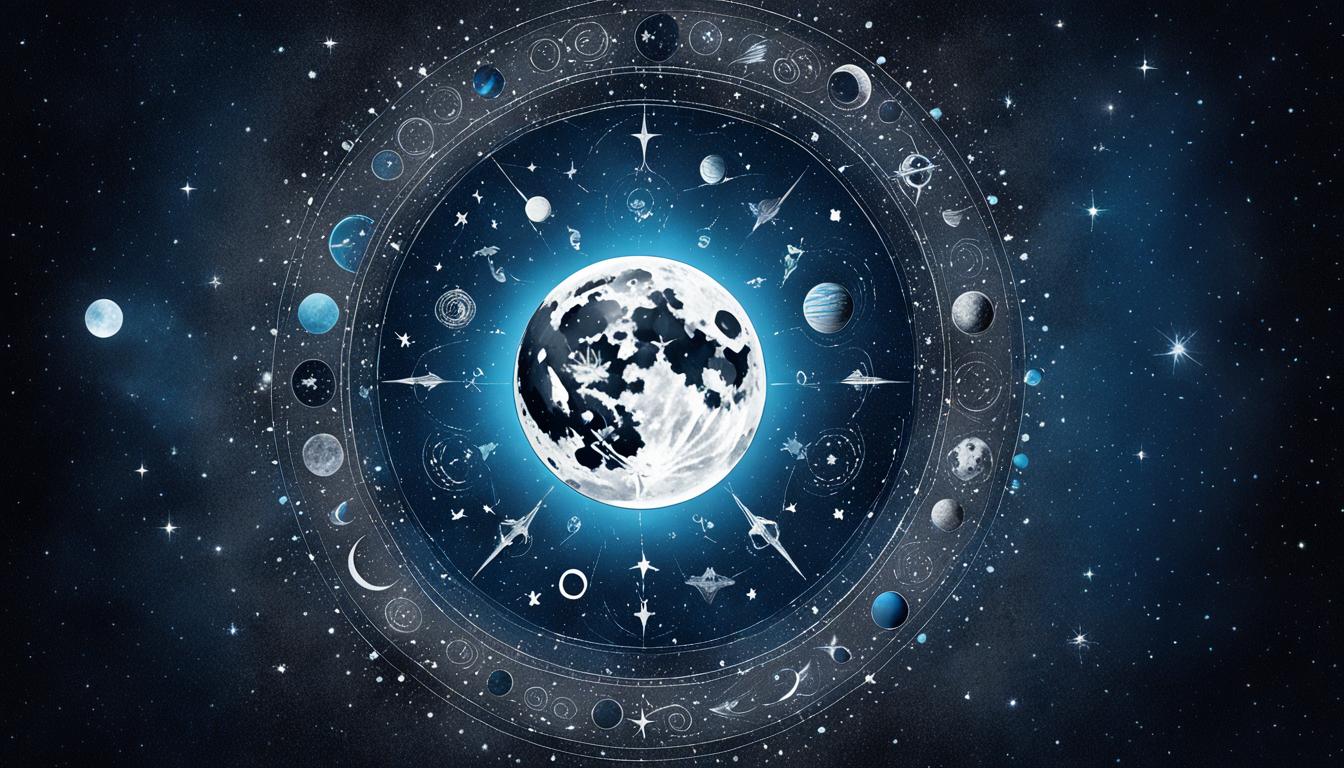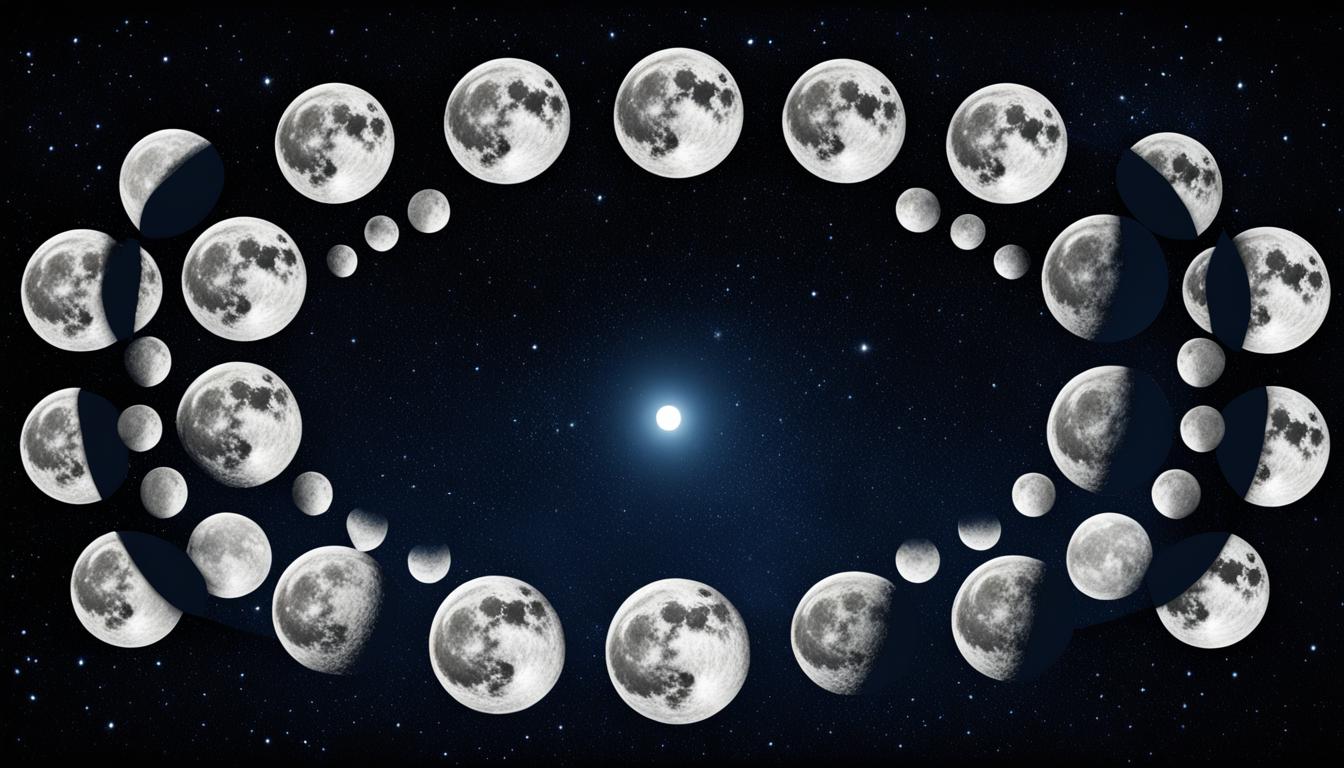Have you ever wondered if the phases of the moon have an impact on your mental health? Or whether lunar cycles can influence your emotional wellness? Many cultures have long believed in the power of the moon, but what does science have to say about it?
Moon gazing meditation is a practice that taps into the benefits of the moon’s light and its connection to the universe. While there is no scientific evidence specifically supporting the benefits of moon gazing meditation, regular stargazers often report increased happiness and relaxation. It’s a practice that can promote a deeper sense of connection to the universe and potentially improve cognitive function and relieve anxiety, according to some studies.
Curious to learn more about the scientific benefits of moon reading on wellbeing? Check out this article that delves into the potential impact of moon phases on mental health, the connection between lunar cycles and emotional wellness, and the benefits of moon meditation and lunar calendar rituals for stress relief.
Key Takeaways:
- Moon gazing meditation aims to harness the benefits of the moon’s light and connection to the universe for a more powerful meditation practice.
- While there is no scientific evidence to support the specific benefits of moon gazing meditation, regular stargazers often report increased happiness and relaxation.
- Moon gazing can promote a deeper sense of connection to the universe and may improve cognitive function and relieve anxiety according to some studies.
- Check out the article to explore the potential impact of moon phases on mental health and the benefits of moon meditation for stress relief.
Moon Gazing: A Connection to Nature
Moon gazing takes meditation practice out into the natural world, allowing individuals to connect with nature and experience the benefits of spending time in nature, even at night. Research suggests that stargazers often report increased happiness, relaxation, and peace[source]. Moon gazing meditation promotes a deeper connection to the universe and all living things within it, reminding individuals of their connection to Earth and the cosmos. Moonlight has a soothing effect and can inspire feelings of wonder, calm, and peace[source].
Connecting with the natural world through moon gazing can be a truly transformative experience. The moon, with its ethereal glow, creates a tranquil environment that allows us to step away from the demands of modern life and immerse ourselves in the beauty of the natural world. The stillness of the night and the radiant glow of the moon invite us to slow down, tune into our senses, and appreciate the wonders of our planet. This connection to nature can have a profound impact on our overall wellbeing, helping us find a sense of balance and harmony in our lives[source].
“Moon gazing allows me to escape the chaos of everyday life and immerse myself in the beauty of the natural world. The moon’s serene presence brings me a sense of peace and tranquility, reminding me of the wonder and awe that exists beyond our busy lives.” – Moon Gazer
Engaging in moon gazing meditation encourages us to be present in the moment and attuned to the rhythms of nature. It offers a unique opportunity to witness the interplay between the moon and the natural world, as nocturnal creatures emerge and the landscape takes on a different appearance under the moonlight. This connection to nature can fill us with a deep sense of appreciation and gratitude, as we recognize the intricate web of life that surrounds us[source].
A Soothing Presence
Moonlight has long been associated with tranquility and serenity. Its gentle glow creates a soothing atmosphere that evokes a sense of calm and relaxation. The soft light of the moon can help us unwind, release stress, and find solace during challenging times. The act of moon gazing itself can be incredibly meditative and grounding, allowing us to find a moment of stillness amidst the chaos of everyday life[source].
A Sense of Wonder
Looking up at the moon can inspire a sense of wonder and awe. The vastness of the universe and the beauty of the night sky can awaken our curiosity and remind us of the infinite possibilities that exist beyond our immediate surroundings. Moon gazing opens our minds to the mysteries of the cosmos, igniting a childlike sense of wonder and reminding us of the interconnectedness of all things[source].
So, the next time you find yourself craving a deeper connection to nature, step outside and gaze up at the moon. Let its soothing light wash over you and allow yourself to be captivated by its beauty. In those quiet moments of moon gazing, you may just find a profound sense of peace and a renewed appreciation for the wonders of the natural world.
Continue reading: Explore the benefits of Japanese forest bathing.
Moon Gazing Meditation vs. Traditional Meditation
Moon gazing meditation offers a unique approach to meditation by incorporating the natural world and the moon’s energy. Unlike traditional meditation, which is often practiced indoors, moon gazing meditation takes individuals outside and encourages them to connect with the universe. By standing barefoot on the ground, practitioners enhance their meditation practice by reminding themselves of their connection to Earth and the cosmos. Moon gazing meditation promotes a deeper connection to the universe and all living things, helping individuals achieve a state of inner calm and mindfulness.
While traditional meditation focuses on turning inward and quieting the mind, moon gazing meditation expands that focus to include the outer world and cosmic energies. It provides a way to align oneself with the rhythms of nature and feel a sense of harmony with the universe.
“Moon gazing meditation allows me to feel connected to something larger than myself. It brings a sense of awe and wonder, reminding me of the vastness of the universe and my place within it.” – Jane, moon gazing meditation practitioner
The practice of moon gazing meditation can deepen one’s connection to the universe and foster a sense of inner peace and tranquility. By immersing oneself in the beauty of the moon and its radiance, practitioners can experience a profound sense of serenity and calmness.
Studies have shown that spending time in nature has a positive impact on mental health and well-being. Moon gazing meditation takes this a step further by inviting individuals to immerse themselves in the natural world, allowing for a deeper connection and a heightened sense of mindfulness.
To learn more about the benefits of moon gazing meditation, you can read this article. For scientific insights into meditation and its effects on the mind and body, you can refer to this research paper.

The Deeper Connection
Moon gazing meditation allows individuals to establish a deeper connection with the universe and tap into the cosmic energy that surrounds them. By gazing at the moon and allowing their thoughts to flow in and out, practitioners can experience a sense of unity and oneness with the world around them.
Moon gazing meditation can be especially beneficial for those who feel a disconnect from nature or yearn for a deeper spiritual connection. By embracing the natural rhythms of the moon and the universe, individuals can find solace and a renewed sense of purpose.
Achieving Inner Calm
One of the key benefits of moon gazing meditation is its ability to help individuals achieve a state of inner calm. By immersing oneself in the beauty of the moon, practitioners can let go of stress, anxiety, and distractions, and find a deep sense of peace.
The serene and tranquil atmosphere of moon gazing meditation can also promote relaxation and improve overall well-being. By focusing on the moon’s gentle glow and connecting with the vastness of the universe, individuals can experience a heightened state of mindfulness and inner peace.
“Moon gazing meditation has become an essential part of my self-care routine. It helps me find balance, release tension, and connect with something greater than myself. It’s a beautiful practice that nourishes my mind, body, and soul.” – Sarah, moon gazing meditation enthusiast
Overall, moon gazing meditation offers a unique and powerful approach to meditation, allowing individuals to connect with the universe, deepen their sense of inner calm, and experience a profound connection with nature. Whether you are a seasoned meditator or just beginning your meditation journey, moon gazing meditation can provide a transformative and enriching experience.
Moon Gazing Meditation Benefits: Myth vs. Fact
Moon gazing meditation is often associated with various benefits, some of which are based on myth and others on traditional beliefs. While there is no scientific evidence to support these benefits specifically, moonlight exposure is believed to relieve anxiety, stress, and improve relaxation by promoting the release of melatonin. Moonbathing, or soaking in the light of the moon, is believed to have benefits for females, including increased fertility and more regular menstrual cycles. Other suggested benefits include improved concentration, better sleep, and a stronger sense of intuition. While scientific studies have not explored the effects of moon gazing meditation specifically, research on Trataka meditation, a related practice, suggests potential benefits such as improved cognitive function and anxiety relief.
moonlight exposure is believed to relieve anxiety, stress, and improve relaxation by promoting the release of melatonin.
Ayurvedic beliefs also attribute a range of benefits to moon gazing meditation. According to Ayurveda, the moon’s power can provide a calming effect on the mind and body, helping to balance emotions and promote overall well-being. Ayurvedic practitioners suggest that moon gazing can help to relieve anxiety and create a sense of peace and tranquility.
Moon’s Power and Ayurvedic Beliefs
Ancient Ayurvedic texts describe the moon as a source of vital energy called “Soma.” According to Ayurveda, Soma is associated with calmness, tranquility, and rejuvenation. Moon gazing meditation is believed to enhance the flow of Soma energy in the body, leading to emotional balance, improved focus, and enhanced intuition.
Improved Concentration and Better Sleep
One commonly claimed benefit of moon gazing meditation is improved concentration. The gentle and soothing light of the moon is said to help calm the mind and increase focus, making it easier to connect with the present moment during meditation.
Moonlight exposure is also believed to promote better sleep. The soft glow of the moon can help regulate the production of melatonin, a hormone that plays a crucial role in sleep-wake cycles. By aligning our sleep patterns with the natural cycles of light and darkness, moon gazing meditation may contribute to more restful and rejuvenating sleep.
Enhanced Intuition and Relieved Anxiety
Another intriguing claim associated with moon gazing meditation is a stronger sense of intuition. The moon has long been associated with intuition and inner wisdom in various cultural and spiritual traditions. Moon gazing meditation may help individuals tap into their intuitive abilities and gain deeper insights into their lives and relationships.
Ancient beliefs and modern-day anecdotes suggest that moon gazing meditation can relieve anxiety and promote a sense of calm. While scientific research has not specifically explored the effects of moon gazing meditation, studies on related practices indicate potential benefits for anxiety reduction and emotional well-being.
Moonlight exposure is also believed to promote better sleep.
Despite the lack of scientific evidence supporting the specific benefits of moon gazing meditation, many individuals find solace and peace in this practice. By connecting with the moon’s energy and taking time to embrace the beauty of the night sky, moon gazing meditation can be a deeply personal and enriching experience, offering a moment of respite and reflection in our busy lives.
Continue reading: Moon Gazing Meditation Benefits
How to Practice Moon Gazing Meditation
Moon gazing meditation is a simple yet powerful technique that can be easily incorporated into your meditation routine. By connecting with the serene beauty of the moon, you can deepen your mindfulness practice and find inner calm. Here is a step-by-step approach to practicing moon gazing meditation:
- Find a comfortable spot outside with a clear view of the moon. If going outside is not feasible, position yourself near a window that offers a view of the moon. Ensure that other lights are turned off to create a moonlit environment.
- Dress appropriately for the weather and ensure your safety during the meditation session.
- Close your eyes and focus on slowing your breath. Inhale deeply, visualizing the moonlight washing over your body. As you exhale, imagine any internal distress being gently released.
- Open your eyes and observe the moon. Take note of its current phase and any specific details that catch your attention, such as craters or patterns on the surface.
- Allow your thoughts to flow naturally as you gaze at the moon. Avoid trying to suppress or chase them; instead, observe them as they come and go, maintaining a sense of mindfulness.
- Continue to breathe deeply and let the moon’s presence guide you into a state of peaceful tranquility.
Moon gazing meditation encourages you to embrace the beauty and stillness of the night, fostering a deeper connection with the universe. By engaging your senses and thoughts, you can experience the transformative power of this practice.
| Benefits of Moon Gazing Meditation | Why It Works |
|---|---|
| Enhanced mindfulness and inner calm | Connecting with the moon’s serene energy promotes a state of deep relaxation and heightened awareness. |
| Promotes a sense of wonder and peace | Moonlight has a soothing effect on the mind and inspires feelings of awe and tranquility. |
| Heightened appreciation for the natural world | Moon gazing meditation brings you closer to nature and rekindles your connection with the Earth and the cosmos. |
By following these simple steps and immersing yourself in the beauty of the moon, you can unlock the transformative power of moon gazing meditation. Allow yourself to be present in the moment, and let the moonlight guide you towards a more peaceful and mindful state of being.

“Moonlight enters the soul, igniting a flame of peace and serenity within.”
For more information on moon gazing meditation and its benefits, visit this comprehensive guide from Healthline.
Potential Risks of Moon Gazing Meditation
Moon gazing meditation is generally considered a low-risk practice. Looking at the moon does not pose the same risk to the eyes as looking at the sun. However, if your eyes begin to sting or water uncomfortably while gazing at the moon, it is best to take a break or blink more regularly. It is also important to prioritize nighttime safety by carrying a flashlight and informing someone if you are stepping outside.
“Moon gazing meditation is generally considered a low-risk practice. Looking at the moon does not pose the same risk to the eyes as looking at the sun. However, if your eyes begin to sting or water uncomfortably while gazing at the moon, it is best to take a break or blink more regularly. It is also important to prioritize nighttime safety by carrying a flashlight and informing someone if you are stepping outside.”
Moon gazing meditation, particularly if practiced before bed, could potentially disrupt sleep onset. If you struggle to fall asleep after moon gazing, consider shifting your meditation practice to earlier in the evening.
- Low risk to eye safety compared to looking at the sun
- Take breaks or blink more regularly if eyes become uncomfortable
- Prioritize nighttime safety by carrying a flashlight
- Consider adjusting the timing of moon gazing meditation to avoid sleep disruption
| Potential Risks of Moon Gazing Meditation | Description |
|---|---|
| Eye Safety | Moon gazing does not pose the same risk to the eyes as looking at the sun. However, discomfort can occur, and it is advisable to take breaks or blink more regularly. |
| Nighttime Safety | Carrying a flashlight and informing someone when stepping outside at night can help ensure personal safety. |
| Sleep Disruption | Moon gazing meditation, especially before bed, may potentially disrupt sleep onset. Consider practicing earlier in the evening if sleep disturbances occur. |
The History of Moon’s Influence on Health
Belief in the moon’s influence on human health and behavior dates back to ancient times. In Mesopotamia, there were rituals to ward off the evil effects of a lunar eclipse, while ancient Greek and Roman cultures associated the moon with fertility and protection during childbirth. In the 16th century, physicians used charts and volvelles to determine how the moon affected their patients and believed that the moon’s phases could enhance the benefits of bloodletting or intensify a patient’s fever. Hinduism also has a close connection between the moon and periods of sickness and health. While many of these beliefs have ancient origins, scientific studies have yet to find conclusive evidence supporting the moon’s direct influence on human health and behavior.
Despite the lack of scientific evidence, the belief in the moon’s influence on health and behavior has persisted throughout history. People from various cultures and time periods have attributed specific qualities and effects to the moon’s presence and phases. However, it is crucial to note that correlation does not equal causation, and much of the perceived influence of the moon may be due to cultural beliefs and myths.
Scientific research has made significant progress in understanding the human body and the factors that impact health. In the realm of space exploration, for instance, NASA has conducted extensive studies on the effects of space travel on the human body, but there is no specific research on the moon’s influence on health (source). While the moon’s gravitational pull can affect tides, it remains uncertain whether it has a direct impact on human well-being.
In conclusion, while ancient beliefs and cultural traditions have long associated the moon with health and behavior, modern scientific evidence supporting such claims is lacking. It is crucial to approach these beliefs with skepticism and rely on well-conducted scientific studies to determine the true impact of the moon on human health and behavior.
Is There Scientific Evidence for the Moon’s Effects?
The moon’s impact on human health and behavior has long been a subject of fascination and speculation. While some studies suggest a potential relationship between the moon and certain aspects of health, such as sleep, mood, menstrual cycles, and childbirth, the scientific evidence remains inconclusive.
One area of interest is the moon’s impact on sleep. Some studies have explored the relationship between lunar phases and sleep quality, but the results have been mixed. While one study found an association between lunar phases and sleep duration and efficiency, another study found no significant effect. Moon’s Impact on Sleep
Similarly, there have been investigations into the moon’s influence on mood. One study suggested that there may be a correlation between certain lunar cycles and positive mood, while another study found no significant relationship. Moon’s Impact on Mood
The moon’s connection to the menstrual cycle has also been explored. Some studies have suggested that lunar phases may influence menstrual timing and cycle length, but again, the results have been inconsistent. Moon’s Impact on Menstrual Cycle
Regarding childbirth, ancient beliefs and folklore have associated lunar cycles with fertility and the timing of deliveries. However, scientific studies have not provided conclusive evidence to support these claims. Moon’s Impact on Childbirth
| Lunar Influence | Scientific Evidence |
|---|---|
| Sleep | The relationship between lunar phases and sleep quality remains inconclusive, with conflicting results. |
| Mood | Research on the moon’s impact on mood has yielded mixed findings, with some studies suggesting a correlation, while others find no significant effects. |
| Menstrual Cycle | Studies exploring the link between lunar phases and menstrual timing and cycle length have produced inconsistent results. |
| Childbirth | No conclusive scientific evidence supports the belief that lunar cycles influence the timing of deliveries. |
It is important to note that these studies often have methodological limitations and are subject to biases such as confirmation bias. Additionally, the moon’s potential effects on human health and behavior may be subtle and difficult to measure accurately. Scientific Evidence for Moon’s Effects
While scientific evidence for the moon’s direct influence on human health and mood is currently lacking, it is possible that the moon may have subtle influences on these factors that are yet to be fully understood. Further research is needed to explore the mechanisms behind any potential effects and to establish conclusive evidence. Until then, the question of whether the moon directly affects human health and mood remains unanswered. Scientific Evidence for Moon’s Effects
The relationship between the moon and human health and behavior is a topic of ongoing scientific investigation. While preliminary studies have suggested potential connections between lunar phases and sleep, mood, menstrual cycles, and childbirth, the evidence is inconclusive. Further research is needed to shed light on the mechanisms behind any potential effects of the moon on human health and behavior.” – Scientific Evidence for Moon’s Effects
References:
Conclusion
The belief in the moon’s influence on human health and wellbeing has persisted throughout history, but the scientific evidence for such effects remains inconclusive. While some studies suggest potential connections between the moon and sleep, mood, menstrual cycles, and childbirth, these findings are not definitive and often produce conflicting results. It is possible that the moon may play a role in these aspects of human life, but more research is needed to fully understand the mechanisms behind any potential effects. In the meantime, individuals can continue to explore moon gazing meditation as a way to connect with the natural world and enhance their meditation practice.
Although mixed studies contribute to the ongoing debate on the moon’s influence on humans, it is important to recognize the importance of further research in this area. Understanding the potential impact of the moon on human health and behavior can have significant implications for various aspects of our lives. By conducting more rigorous and comprehensive scientific studies, we can unlock valuable insights that may help enhance our understanding of these phenomena and their potential consequences.
To delve deeper into the subject, interested readers can refer to this study which explores the potential correlations between the moon and human health. The study provides valuable insights and analysis based on scientific research in this field, shedding light on the current understanding of the moon’s influence on humans. By exploring the existing scientific literature, individuals can gain a better understanding of the ongoing research and contribute to the broader discussion surrounding the moon’s potential impact on various aspects of human life.
FAQ
What are the scientific benefits of moon gazing on wellbeing?
While there is no scientific evidence to support the specific benefits of moon gazing meditation, regular stargazers often report increased happiness and relaxation. Moon gazing can promote a deeper sense of connection to the universe and may improve cognitive function and relieve anxiety according to some studies.
How does moon gazing promote a connection to nature?
Moon gazing takes meditation practice out into the natural world, allowing individuals to connect with nature and experience the benefits of spending time in nature, even at night. Research suggests that stargazers often report increased happiness, relaxation, and peace.
What is the difference between moon gazing meditation and traditional meditation?
Moon gazing meditation offers a unique approach to meditation by incorporating the natural world and the moon’s energy. Unlike traditional meditation, which is often practiced indoors, moon gazing meditation takes individuals outside and encourages them to connect with the universe. It promotes a deeper connection to the universe and all living things within it, helping individuals achieve a state of inner calm and mindfulness.
Are there any scientific benefits to moon gazing meditation?
While there is no scientific evidence specifically for moon gazing meditation, related practices such as Trataka meditation have shown potential benefits. These include improved cognitive function and anxiety relief. Moon gazing meditation may offer similar benefits, but more research is needed to confirm.
How can I practice moon gazing meditation?
To practice moon gazing meditation, find a comfortable spot outside with a clear view of the moon. Close your eyes, slow your breath, and visualize the moonlight washing over your body. Open your eyes and gaze at the moon while allowing your thoughts to flow in and out. The goal is increased mindfulness and inner calm.
Are there any risks associated with moon gazing meditation?
Moon gazing meditation is generally considered a low-risk practice. However, if your eyes become uncomfortable while gazing at the moon, it is best to take a break or blink more regularly. It is also important to prioritize nighttime safety by carrying a flashlight and informing someone if you are stepping outside.
What is the history of the moon’s influence on health?
Belief in the moon’s influence on human health and behavior dates back to ancient times. Various cultures associated the moon with fertility, protection during childbirth, and periods of sickness and health. However, scientific evidence supporting the moon’s direct influence is inconclusive.
Is there scientific evidence for the moon’s effects on health?
The scientific evidence for the moon’s effects on human health and behavior is inconclusive. Some studies suggest potential relationships between the moon and aspects such as sleep, mood, menstrual cycles, and childbirth. However, more research is needed to fully understand these potential effects.
What is the conclusion regarding the moon’s influence on humans?
The belief in the moon’s influence on human health and wellbeing has persisted throughout history. While some studies suggest potential connections, the scientific evidence remains inconclusive. Further research is needed to fully understand the mechanisms behind any potential effects.










[…] journal can be incredibly helpful. Tracking energy levels throughout the different phases of the moon allows us to recognize…
[…] Reading is a new platform that offers personalized insights based on the lunar cycle1. It’s different from generic horoscopes,…
[…] As we set intentions aligned with the New Moon energy, we open ourselves to the power of manifestation. By…
[…] intentions during the new moon is a powerful practice that allows me to declare my goals and aspirations. It…
[…] These readings provide a convenient and accessible way to connect with the energies of the new moon and gain…